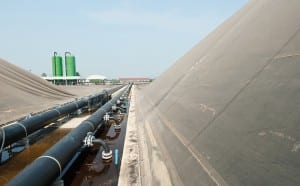Charlotte Morton, chief executive of the Anaerobic Digestion & Bioresources Association (ADBA) offers a few thoughts on the UK AD sector ahead of the AD & Biogas show taking place in July
THIS year’s UK AD & Biogas on 6-7 July at the NEC, Birmingham, will be our first international trade show – firmly establishing the role the industry can play in the global economy, and the UK industry’s place at the crest of this technological revolution with over 450 agricultural, food waste, sewage and on-site industrial AD plants.
Having experienced an astonishing 600 per cent growth in the UK outside of the water sector since 2009, the AD industry offers a wealth of technical knowledge and operational expertise, putting it at the forefront of a global AD technology revolution with exports potentially worth billions.
As fast as the UK industry has grown, the potential remains far greater. Despite political challenges to renewable energy support, policies remain in place to support at least some further growth: the Renewable Heat Incentive (RHI) budget will almost treble between now and 2021 and could support 100 additional biomethane projects; the government is actively looking at how to support biomethane in transport; there’s plenty of current activity in the market, with an estimated 100 plants building now; and the Committee on Climate Change has specifically recommended that biodegradable waste should be removed from landfill, and AD used to reduce emissions on farms.
Overall the UK industry’s future prospects are, however, under serious threat from ill-considered and short-termist policies which challenge the continued commercial viability of new AD sites. Despite government’s renewed commitment to the generation of renewable heat, RHI tariff degressions continue to alarm developers while support under the Feed-In Tariff (FIT) Scheme has halved. In addition to reduced funding support, government is consulting on the parameters of an RHI budget cap and have already implemented a FIT cap at the ridiculously low deployment level of just 5MW per quarter (industry has already exhausted this allowance for each quarter of 2016) thereby substantially curtailing industry growth just as AD had started to bloom.

The impact of these tariff reforms are further compounded by the collapse on wholesale energy prices, tumbling gate fees in England as councils fail to back source-segregated waste collection schemes and concerns about increasingly overburdensome regulations emanating from the Environment Agency.
These threats certainly present a challenging environment within which operators can continue to turn a profit and suppliers can continue to build and update plants. There are however a number of steps that industry is taking to maximise return on investment and sustain AD’s growth, and these will be thoroughly explored at the industry’s biggest annual event, UK AD & Biogas: http://adbioresources.org/uk-ad-biogas-2016.
Maximising the value from waste
With the right policy support, continued innovation and plant deployment will ensure industry drives down the cost of generating vital baseload energy, and in so doing drive up AD’s return on investment, potentially: delivering 30 per cent of domestic heat or electricity; saving bill payers £1.2 billion in carbon abatement costs; fuelling up to 80 per cent of HGVs; reversing soil degradation trends that cost the UK about £1.4 billion each year; generating 30,000 more jobs; and extracting the greatest possible value from inedible food waste.
These are benefits that filter down to every household by ensuring a sustainable, yet profitable future where we not only maximise the value from our finite resources but also lead the rest of the world in doing the same.








